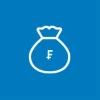Interest rates for customers of Swiss banks are lower than ever. That applies not only to savings accounts, but also to current accounts, retirement accounts and business accounts. Returns earned on money deposited in banks have been trending downward since 2008. Rates continued to decline throughout 2016.
Interest low-point for private and business accounts
Average interest rates are now 0.1% (median: 0.065%) for Swiss savings accounts for adults, 0.04% (median: 0.01%) for euro savings accounts for adults, 0.63% (median: 0.5%) for youth savings accounts, 0.46% (median 0.5%) for 3a savings accounts, 0.19% (median: 0.2%) for vested benefits accounts, 0% for private accounts for adults and 0% for business bank accounts. Those poor rates make 2017 a general low-point for bank customers.
Negative interest rates for private customers compared
Swiss retail banks have not yet begun to pass on negative interest rates to small savers. However, some have begun to impose negative interest rates on savings accounts which hold large amounts of assets. These include the Alternative Bank Switzerland (-0.75% for assets in excess of 100,000 Swiss francs), PostFinance (-1% on assets in excess of 1 million francs) and Swissquote (-0.75% on assets in excess of 1 million francs).
The Alternative Bank is the only bank which charges retail customers interest on assets regardless of the amount of deposits held. However, this only applies to private accounts and not to savings accounts. Private accounts at the Alternative Bank come with negative interest rates of -0.125% which increase to -0.75% for assets in excess of 100,000 francs.
Negative interest rates for high-value and business customers
The situation for institutional customers and larger businesses is more precarious. A number of Swiss banks already charge negative interest rates. Some, like the Aargauische Kantonalbank, charge negative interest rates on assets in excess of 5 million francs, while others – including the WIR Bank – impose negative rates on assets above 10 million francs. Many other banks use varying negative interest rates based on customer profiles. Since July of 2016, Raiffeisen Switzerland has also recommended that member banks pass on negative interest rates to business customers.
Negative interest rates on private savings unlikely
A survey of 40 Swiss retail banks conducted by moneyland.ch in January 2017 asked nationwide, cantonal and regional banks whether imposing negative interest rates on private and business customers in 2017 was a realistic option. The results show that most banks do not expect to impose negative interest rates on customers in the future. Doing so would undermine the banking business model, as highlighted by the Basellandschaftliche Kantonalbank.
Exception: The majority of banks would consider negative interest for customers if the Swiss National Bank (SNB) were to drastically lower its rates. However, banks rated the possibility of negative rates being charged to businesses and high-value customers as notably higher than the likelihood of negative rates for regular customers.
Major interest rate differences
Comparing rates can still pay off in spite of the general low interest environment. The difference in interest earned through the most and least profitable savings accounts for adults spans 0.65%. This difference is even more pronounce for youth accounts – spanning 1.225%, and for 3a retirement accounts, spanning 1%. This example shows how these differences can affect your wealth: When applied to an initial deposit of 50,000 francs, a 1% increase in interest earned translates into a gain of 2500 francs over just 5 years – as an analysis using the saving calculator on moneyland.ch shows.
Mortgage and consumer credit interest rates compared
While deposits suffer under low interest rates, borrowers are profiting from low interest rates on mortgages and loans.
However, the losses incurred by savers are not simply being passed on to borrowers in the form of cheaper loans. The lower effective interest rates on consumer loans are the direct result of legal regulations imposed in July, 2016, which limit the maximum rates which lenders are allowed to charge. Interest rates for mortgages, on the other hand, have gone up again after reaching a low-point last year.
Is there an alternative for savers?
A common mistake made by savers is that they hold more money than necessary in private accounts which are meant to be used for transactions. Many banks no longer pay interest on assets held in private accounts. The situation is somewhat better where savings accounts are concerned in that you do earn some interest on your wealth.
Assets held in 3a retirement savings accounts continue to earn more interest than those held in regular savings accounts in 2017, and also benefit from tax privileges. The option of investing 3a assets through 3a retirement funds is an additional benefit. Retirement fund investments can yield higher returns than savings accounts, but are only recommended for longer-term investments because they carry more risk.
Those who want to invest in stocks or funds without tying up their wealth in the third pillar should be aware of the higher risk involved and have the financial ability to wait out long periods of poor returns. When choosing the right fund, looking for the lowest possible fees and charges is decisive. Investors who want to actively manage their investments on their own should ideally use the most affordable online broker which provides the services they need.
More comparisons and calculators:
Savings account comparison
Savings calculator
3a retirement savings account comparison
Vested benefits account comparison

 Deal of the Day
Deal of the Day 









